- Home
- Sebastian Faulks
A Week in December Page 32
A Week in December Read online
Page 32
‘Did you have a nice word with the princess?’
‘Pardon?’
‘She’s ever such a chatterbox once she gets doing. There you are, sir. One little gong. Take care now.’
Finn slept badly and woke to find life even worse. In order to calm himself after the trauma of Alan the schizophrenic’s on-screen suicide, he’d smoked a large joint of Aurora/Super Skunk Two, and he’d inhaled it quickly, leaving no time to gauge its effect. He had fallen deeply asleep, at last, towards dawn.
As soon as he awoke, he fell asleep again, or so he thought. Yet he seemed to be up and moving about in his room. Now this was the dream from which he must awake. He found that he was still in bed. If he fell asleep again, he would never wake, but now he was in the bathroom, the tap was running, he’d turned on the mighty shower that flooded down like a Yosemite cascade, so why was he still lying in his bed? The sheets would be wet from the shower.
‘Get up, you’re late,’ said a woman’s voice, though not his mother’s.
Finn heard his own voice, or thought it was his own.
‘I need to go to school.’
‘It’s the last day of term.’
‘I haven’t done my homework, though.’
‘Get up, you useless fucking lump. Get up.’
Finn was on all fours, crawling to the door. The room was full of people, full of voices. He couldn’t see the people. Perhaps, he thought, I’m still asleep.
He rested his face on the floor, feeling the tight weave of the grey carpet on his soft skin, abrasive against a new spot forming on his chin.
He called out for his mother, shouting as he lay in the doorway. ‘Mum! Mum! Mummy!’
He curled himself up into a ball and gripped his ribs tightly through his tee shirt.
‘She’s never going to come. She can’t hear him.’
‘Mum-my!’
‘He’s such a sack of shit.’
There were too many thoughts in Finn’s mind; so much coming in at once that he wasn’t able to receive and organise it all. The breakwaters had been washed away.
He wanted to move his body down the stairs to find help, but couldn’t mobilise the part of his brain that would have sent the command to feet or legs. He couldn’t find it in the chaos. The only movement he could make was a reflexive tightening of his arms around his ribs.
A voice was calling for his mother, but he didn’t know if it was his.
Other voices contradicted him.
Eventually, there was a hand on his shoulder. It was Vanessa, though Finn was not sure that she was there.
‘What on earth is the matter, darling?’
II
Hassan left his parents at the palace, his father stunned, his mother pink with fussy pride, and walked up over the grass to Green Park Tube station on the Piccadilly Line.
At last, he thought, I am back in real life, back with things that matter. In the train, he took off his tie and stuffed it in his pocket. He was due at ‘the pub’ at 12.40, having asked Salim if he could be the last to arrive. The timing would be tight, but such was his elation that he wasn’t worried. It was God’s work, God’s will.
He’d read accounts of Islamist groups in the kafir press and he’d read fine writing about what went on in the heads of ‘terrorists’; he’d seen a ‘drama-documentary’ in the cinema about the planes that crashed into the Towers. What no one talked about, no one seemed to understand, was the joy – the pure exhilaration of belief!
People like himself were portrayed as madmen, mumbling, but as the Tube train rattled up to Manor House, he had never felt more lucid. It was all, as Ali had pointed out to them in Bradford, so simple. Life did not need string theory, eleven dimensions and a battering of the head against the inherent contradictions of human consciousness. All it required was to follow a simple revealed truth. There it was, on the bookshelf for £6.99. For all time. What was more amazing, the glorious purity of the truth or the boneheaded refusal of people to accept the gift that had been given them?
Hassan went down the lazy street with its outdoor life for what he thought would be the last time, and rang the bell marked ‘Ashaf’. Salim let him in. Upstairs were Gary the Gold Tooth Hindu, Seth the Shy One and Bald Elton.
There were four rucksacks sitting in the middle of the bare wooden floor.
In the corner, with his back to them, looking over the scrap of garden was someone Hassan hadn’t seen before. The man turned round.
‘This is Steve from Husam Nar,’ said Salim. ‘Steve, this is Jock.’
Steve was a short, tubby man of African appearance, about thirty years old. ‘In these bags,’ he said, ‘are bomb components. We’ve used hydrogen peroxide injected into drinks bottles. This is a development of what was due to be used on those aircraft, where you need only a fairly small explosion to bring the plane down. We needed more bang, so each of you is carrying twenty-five drinks bottles. The detonators are in disposable cameras. The battery contents have been replaced by HMTD, or to give it the proper name, hexamethylene triperoxide diamine. This works as the primary explosive, or primer. It’s unstable enough to go off easily, but stable enough to transport. Next to it in the battery casing is a small light bulb. When the camera is turned on, the charge to the light bulb is enough to detonate the HMTD which in turn sets off the main explosive. All clear?’
They all nodded. Steve had a thick East African accent, but his words were easy enough to follow.
‘Listen carefully. You each go separately to the target. There are no trial runs. At the target you reassemble. You choose exactly where in a minute. One of you will carry all the detonators because we can’t risk travelling on the train with the detonators in the same bag as the explosive. They’re in this fourth bag here. Once you’re at your assembly point at the target, the detonators are given out and the man who brought them is given his share of explosive by the other three. You’ve chosen?’
‘Yes,’ said Salim. ‘Jock will take the detonators.’
‘OK,’ said Steve. ‘The timing is that you meet at 11 p.m. tomorrow. You travel alone. You make your own travel plan. If you’re on the same train and happen to see one another, ignore it. The target is fifteen minutes’ walk from a busy railway station so there’s no problem about getting there. You need to leave plenty of time, but not too much. Hanging around can be dangerous. Give yourself half an hour leeway but no more.’
The atmosphere in the room had become tense. Hassan no longer felt elated. Something about the charmless, practical way that Steve drove onwards made him feel, for the first time, extremely frightened.
From inside his coat pocket, Steve took out a folded piece of paper. When he opened it out fully, it was the size of a lecturer’s flip chart. He laid it flat on the table.
‘This,’ he said, ‘is Glendale Hospital. The local railway station is fifteen minutes this way. The map is not to scale because you need to see the layout of the different units in detail. The first three will be detonating here, here and here. The greatest density of patients is in this building here. It’s possible that the first blast will be such that it will detonate the second without you needing to use the camera. Because of the long corridor that joins this outbuilding with the main hospital, the blast should be funnelled through into the main building, which is where the fourth and largest bomb will be placed. The outbuildings form a specialised psychiatric unit, but the main building is a general hospital, and the wing attached here, where the fourth blast will be, has “long-term” units on the first floor – people who are dying, basically – and then the maternity unit on the floor above. Our experts chose this site because of its particular vulnerability. The psychiatric clinic has quite low security, only two porters on the main gate, just here, and simple signing-in at a desk inside. But my ballistics man in Pakistan told me that this joining corridor, which is really there for catering trolleys and things, this bit here, will magnify and funnel the blast and so help with the bomb in the main building. We don’t need to
go into all those details now. What we do need is for each of you to have a very clear picture in his head of this layout and of where your rucksack is going to be put down. So come and have a close look. Once you’ve got the overall plan clear I’ll show you photographs of the interiors.’
The four men gathered round beneath the eye of Steve and Salim.
Hassan inspected the red-felt outlines of Collingwood, Beardsley, Arkell ... He tried to be businesslike and cool, but a question kept shaping itself in his mouth. He was glad it wasn’t him but quiet Yorkshire Seth who finally spoke.
‘So ... Are you saying we’re attacking a hospital?’
‘Yes.’
‘I ... I ...’
Seth seemed unable to continue.
None of the others spoke. Perhaps, Hassan thought, by not acknowledging that there might be an issue, Steve and Salim were hoping to kill any hesitation at birth. They merely gazed at Seth.
Eventually, Steve spoke. ‘It’s an ideal target. It ticks all three boxes. News impact. Density of population. And third, though this is less important, scarcity of Muslim victims. You may or may not know that the Muslim population is under-represented in hospitals. There are no alcohol-related illnesses, fewer obese people with diabetes and so on. The figures are even better in psychiatric care. As far as density of people is concerned, it’s not as good as the Tube, but security on the Underground is now so tight that it’s become impossible. For news impact a hospital is even better than the transport system. Personally, I don’t feel that Muslim presence or absence is of great concern considering that any believer who dies will be assured of his place in paradise. But there were some people who felt uneasy about the Edgware Road Tube bomb going off in such an Arab area, where so many passers-by were likely to be Muslim. All clear?’
‘Yes,’ said Seth. ‘But ... You know ...’
‘No, I don’t.’
‘For fuck’s sake,’ said Gary, the ex-Hindu. ‘If we’re trying to build a just world by undermining what is unjust, what difference does it make if someone’s having their appendix out?’
‘I know, but—’
‘Having a sprained ankle doesn’t make them any less a part of the Jahiliyya.’
‘I just ... No, you’re right.’
‘You’re not thinking some kafir shit about “fair play” or something, because—’
‘No, no, stop it. I understand. Stop it. I’m sorry I mentioned it.’
When the silence had been left for about twenty seconds, Steve said, ‘All right. Four bombs. You number from one to four. One, two, three, four.’ He prodded them each in the chest with a number. ‘Now we’ll look at the photographs of the interior. Memorise them.’
Finn was sitting at the kitchen table in the basement, shaking wildly. On the floor were shards of broken crockery, where he had thrown cups and saucers round the room, screaming at his mother, screaming at invisible tormentors in his just-broken voice. Vanessa, with a throbbing shin where he had kicked her, had her arm round him and was trying to make him eat some yoghurt and cereal while they waited for Dr Burnell.
Vanessa stroked Finn’s hair back from his forehead with her spare hand and murmured comforting words. He seemed, for the moment, to have pulled back from the edge of violence.
‘It’ll be all right, darling, it’ll all be all right.’
She had no idea what ‘it’ was, but felt profoundly that it was her fault. She had let Finn live as he chose because he seemed to like it that way and she didn’t want to be intrusive – forever knocking on his door or nagging. So she had thought. Now as the child trembled in her arms she could see that she had left him alone because trying to understand him had been too difficult: teenage heart-to-hearts required too much bracing of herself, too much tension, too much effort to make contact with the boy who still existed beneath the gravelly, spiked exterior; too much time away from the cool wines of Burgundy and the TV remote control.
The front doorbell rang and she heard Marla go to answer it. She ran upstairs to the hall herself.
Burnell was a youngish man who had recently joined an established private practice in Arundel Gardens. Although he could be offhand and less sympathetic than his older colleagues, Vanessa liked him because he prescribed her powerful sleeping pills without question.
Downstairs in the kitchen, he examined Finn, taking his pulse, shining a torch into his eyes.
‘So, tell me what happened.’
‘I heard him calling me from upstairs. He sounded desperate. I thought he must have fallen over and broken his leg or something. When I got there he was lying on the floor, just sort of whimpering and holding himself. The awful thing is I can’t seem to get through to him. When he speaks it seems to be to someone else. And then he began attacking me and throwing things around down here.’
Burnell nodded. His freshly shaved face had a small cut, to which a piece of bloodied cotton wool was still attached. He made Finn hold out his hands in front of him. They were shaking. Then he shone the torch into his eyes again.
‘Finn, I want you to tell me everything you did yesterday. I need to know if you drank alcohol or took drugs of any kind.’
He slapped Finn, not unkindly, on the cheek. ‘Did you hear me, Finn?’
Finn did not respond.
‘Drugs?’
Again, Finn seemed not to hear.
‘What kind? Ecstasy? Acid? Skunk?’
This question seemed to be beyond Finn. He covered his face with his hands.
‘I think we should go and look in his room,’ said Burnell. ‘Is that all right?’
Vanessa nodded, shame-faced. She dreaded to think what needles and tourniquets they might find.
Burnell glanced at the boy. ‘I don’t want to leave him. Let’s all go up.’
In the ashtray on the floor, among the cigarette ends, were the butts of three joints that Burnell lifted to his nose and sniffed.
Vanessa smiled. ‘Thank God. I thought it was going to be something serious. You know, like heroin or—’
‘Doesn’t this seem serious enough?’ said Burnell. ‘Look at him.’
Vanessa said, ‘But I thought, you know, soft drugs, marijuana and so on ...’
‘Perhaps in the sixties. Not now. It’s brutal. Genetically modified for impact. One of these today may be like thirty from your day.’ He turned to Finn. ‘How long have you been smoking this stuff? Do you have any more? Where do you keep it?’
Finn turned away and gripped his mother’s arm. ‘They can’t come. They told me they can’t come. It’s not my fault,’ he said.
‘All right,’ said Burnell. ‘I’m going to give him a sedative. Then I think we need to get him into hospital.’
‘Hospital?’ said Vanessa. ‘Surely there’s no need for that?’
‘Not in the long run, I hope. But he definitely needs to see someone in a detox or psychiatric unit. I don’t feel happy about leaving him without specialist supervision. When I’ve given him the injection, he should calm down quite a bit. You stay with him here, and I’m going to go outside and make a couple of calls to a place I know. Glendale. It’s a National Health hospital, but in my view it offers better care than any private clinic. You may have to go private to get him in at short notice. I’m assuming that’s all right?’
‘God, yes. Of course,’ said Vanessa. ‘Whatever’s best.’
III
I love him, thought Jenni Fortune. That’s the word for it.
She was between Westminster and Embankment, having to remind herself to be vigilant – to watch for office workers coming out of lunchtime Christmas parties. Men often walked down the ramp at the end of the platform to relieve themselves on the rails. Sometimes there was clearance between their shoulders and an arriving train; and sometimes there wasn’t.
Is this the first time I’ve felt love? Maybe for Mum, Jenni thought, never for anyone else. Not her father, not Tony and not Liston Brown. What was that feeling with Liston? Frightened. That’s really all it was, when she lo
oked back on it. She had wanted his protection, his power. There was the promise of safety there, but it had never materialised. All she had had was disappointment and anxiety, thinking she wasn’t glamorous enough for him – too white, too black, too poor, too young, too ignorant, not knowing whether sex was what he wanted more or less of, where exactly it figured in his opinion of her. And having no one to turn to for advice, the other women cautious, not confiding, and the men eyeing her with a knowing look, a bit contemptuous, she always felt, as though they were thinking ‘We know her game’, but also impressed that she was Liston’s girlfriend. She hadn’t wanted to impress anyone.
But with this guy ... There was a moment when it had all changed, perhaps when she saw him struggling not to let her pay in the restaurant; maybe when she felt him staring at her when he went round on Wednesday in her cab; possibly long ago, when he tried to spare her Mr Hutton’s heavy-handedness, that touch of kindness – God knows, perhaps as early as the first time she saw the newspaper sticking out of his wastepaper basket with the squiggles in the margin. He was so thin that she wanted to hold him close to her. There was something sad in him she wanted to put right. And for some ridiculous reason she felt that only she could do that. No one else.
It made her smile. How likely was that? That only she ... And yet she knew that it was true. No one but her could make that man come truly alive, put on weight, flourish and be happy.
She closed the doors, depressed the lever and moved it gently to the left. Of course, he wasn’t just a patient or a case. There was so much that she could take from him, so much he knew, so many thoughts he’d had ... Things that had never crossed her mind – though when he talked about these things, she seemed to have been aware of them all along. And they would laugh, she knew. He made her laugh already and when she’d got more confidence, she’d do the same for him.
There was something comic in it all, admittedly. To have a feeling like this, right down close to her ribs, right in the intimate centre of who she was, not for her mother but for a barrister ... A man who probably spoke Latin.

 Devil May Care
Devil May Care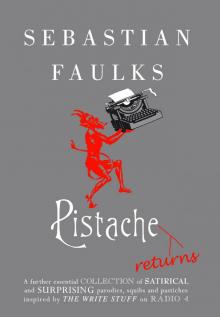 Pistache Returns
Pistache Returns The Girl at the Lion D'Or
The Girl at the Lion D'Or Pistache
Pistache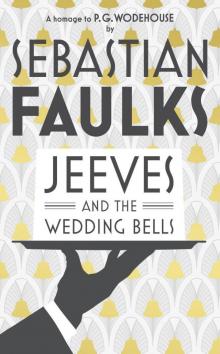 Jeeves and the Wedding Bells
Jeeves and the Wedding Bells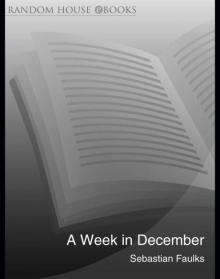 A Week in December
A Week in December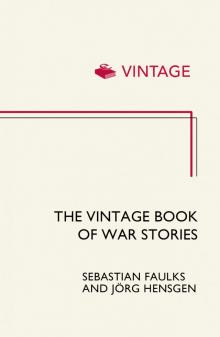 The Vintage Book of War Stories
The Vintage Book of War Stories Engleby
Engleby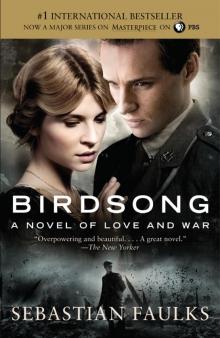 Birdsong
Birdsong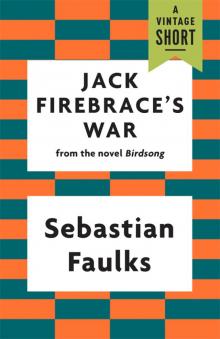 Jack Firebrace's War
Jack Firebrace's War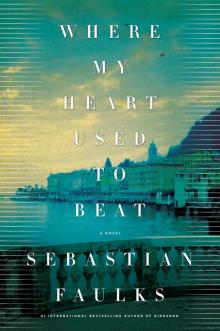 Where My Heart Used to Beat
Where My Heart Used to Beat A Possible Life
A Possible Life The Fatal Englishman: Three Short Lives
The Fatal Englishman: Three Short Lives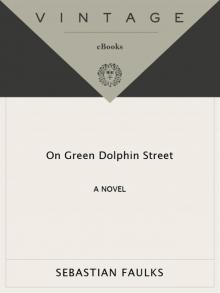 On Green Dolphin Street
On Green Dolphin Street Charlotte Gray
Charlotte Gray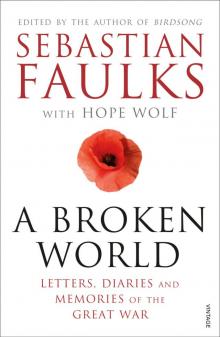 A Broken World: Letters, Diaries and Memories of the Great War
A Broken World: Letters, Diaries and Memories of the Great War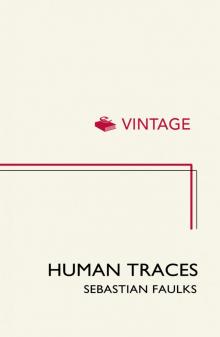 Human Traces
Human Traces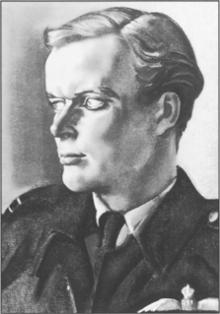 The Fatal Englishman
The Fatal Englishman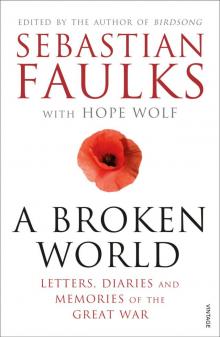 A Broken World
A Broken World Paris Echo
Paris Echo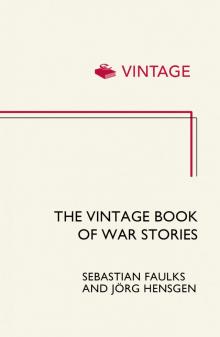 War Stories
War Stories Girl At the Lion d'Or
Girl At the Lion d'Or